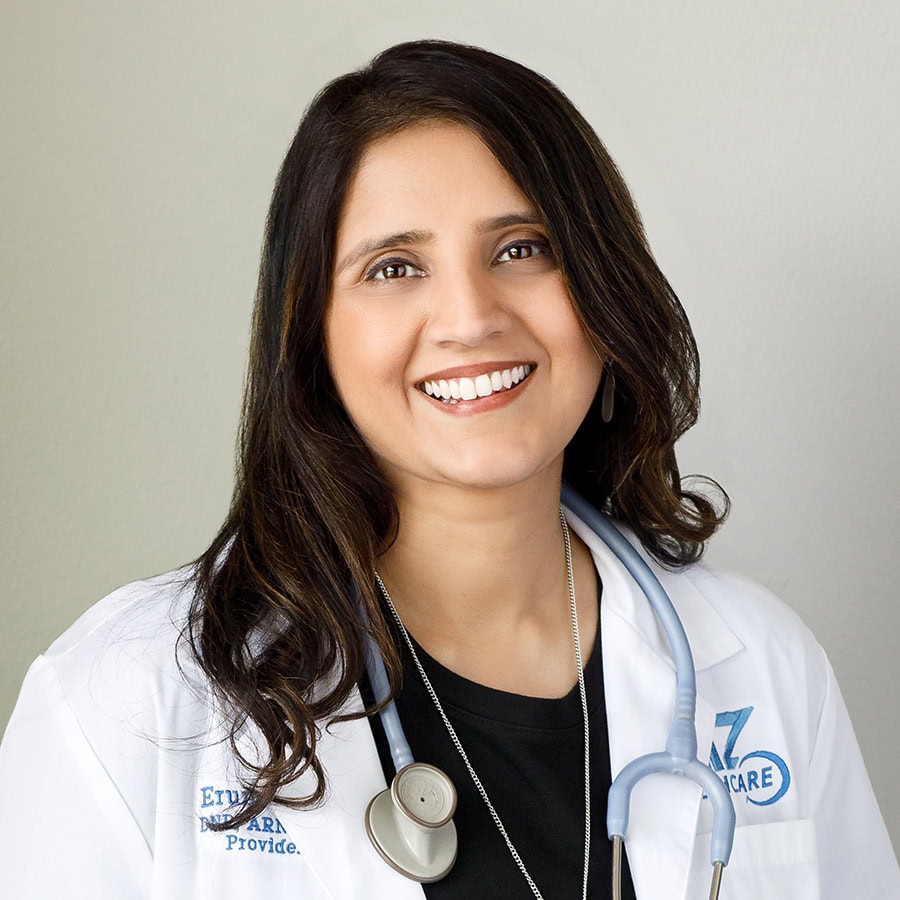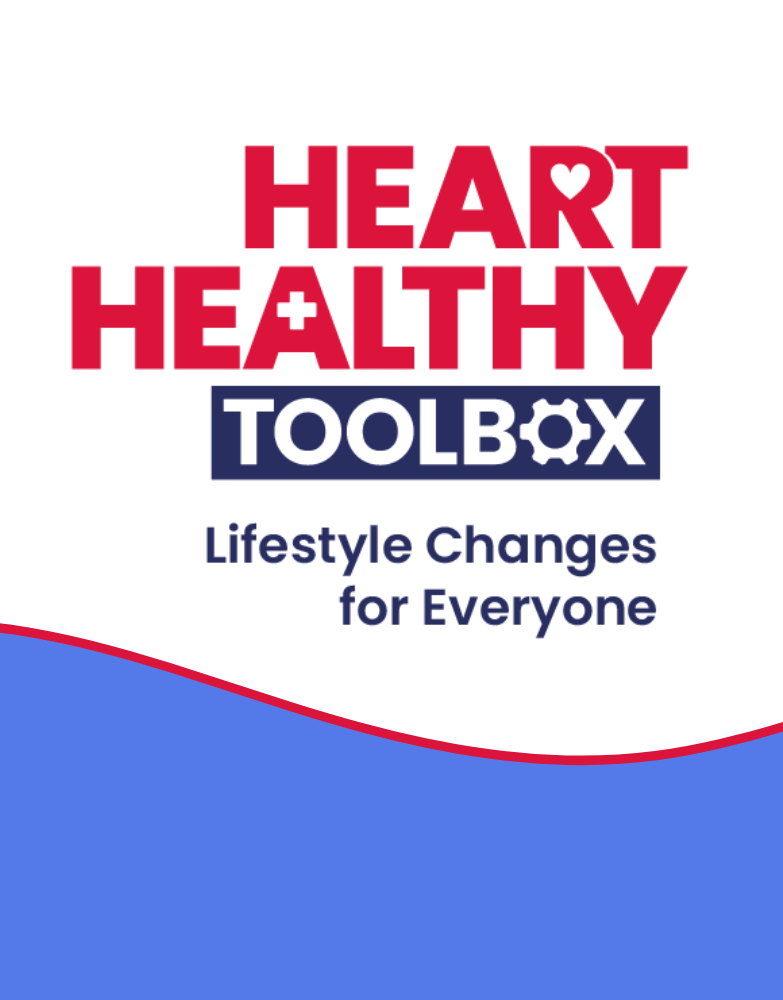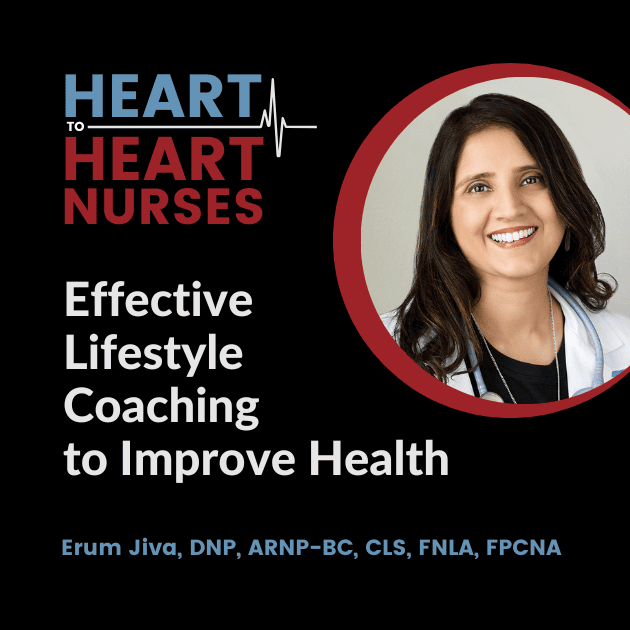Health coaching requires personalized recommendations, multiple conversations, and shared decision-making. Learn about the 3 Es and 3 Ps of coaching, motivational strategies, and the importance of self-care. Guest Erum Jiva, DNP, ARNP-BC, CLS, FNLA, FPCNA.
Episode Resource
Welcome to Heart to Heart Nurses, brought to you by the Preventive Cardiovascular Nurses Association. PCNA’s mission is to promote nurses as leaders in cardiovascular disease prevention and management.
Geralyn Warfield (host): (00:20) Welcome to today’s episode where we have Erum Jiva here to talk a little bit about prevention, and motivation, and some other topics. I’m going to let her introduce herself to you.
Erum Jiva (guest): (00:30) Sure, my name is Erum, I’m from Ocala, Florida. I’m a Doctor of Nursing Practice and Advanced Nurse Practitioner. And currently I have my own practice, A to Z Healthcare, where we mostly try to work on the preventive side of medicine because that’s actually my passion. And that’s the reason I picked this topic because for me, the preventing disease is not just a profession for me, it’s a calling.
And I honestly believe that as a healthcare provider, we play a very major role for the preventing disease in advocating our patients.
Geralyn Warfield (host): (01:08) Well, you definitely have come to a podcast in the right place, the Preventive Cardiovascular Nurses Association. And I know that you wanted to talk a little bit about coaching and how that fits into the whole sphere of what you do. So, I’m going to let you go ahead and take that topic away.
Erum Jiva (guest): (01:24) So sure. The health coaching is, I would say, my favorite part of my job I do on daily basis. And the first important thing I want to emphasize over here is that health coaching is very individualized. One thing works best for you, might not be going to work best for other.
So, it has to be very individualized, giving proper timing to the patient. Listening to them, what their needs are, what they are looking for, what are the barriers they are having, so you can guide them appropriately.
So proper health coaching involves personalized guide and support to improve their heart health also, so they can identify their own risk factors that what are the things they need to work on.
Geralyn Warfield (host): (02:11) So when you’re doing these coaching sessions with patients, what are some strategies that you have used, and it could be kind of the transaction, if you will, of meeting with them a particular amount of times, or keywords that you use, or maybe keywords that you don’t use that really seem to work with your patient population?
Erum Jiva (guest): (02:34) So, it’s very interesting when I’ll share this with you that I remember my three E’s and three P’s.
So, three E’s.
The first E is empowerment. Very, very important. So that helps to understand the patient that they need to understand that they have the ability to improve on, but they need someone to tell them that, you know, we are there, and you can improve, you can modify your lifestyle, and we can help you out with that. So that’s my first E, I always start with empowerment.
The other E I usually use is emotional support. Because many times when they come to us, the major problem is that they feel like, you know, I have so many things going on in the life and it might not be easy to do it. I always tell my patient that life is, things will be going on in the life, but we need to know, we need to go along and see how we can help each other to make changes in the life and take care of the heart and have a healthy heart. So emotional support, like acknowledge them and validate that their feelings and concern are genuine, but they are the ways to work around. So that’s my second E I’ll aways work with.
The third one is education. Always very important. Education needs to be very clear and accessible. And that’s why I mentioned that it needs to be individualized. I usually see different kinds of patients all the time. I have teachers, I have healthcare providers I’m seeing. I have patients who are truck drivers. So, they are all from different fields. So, I can’t have the same plan for everyone. So, education, plus it has to be accessible, and it should be according to their lifestyle so they can implement practically.
So, these are my three E’s, empowerment, education, and emotional support.
When it comes to P, my first P is a personalized goal. It goes with like the same thing I just mentioned, that if I have a teacher, my goals and my plans will be different as compared to a truck driver who’s on the road all the time. I can’t ask the truck driver to stop living and just follow my guidelines and do the healthy lifestyle, just eat healthy and go to the gym. He has to earn money, right? So, it has to be a personalized goal, and I would say that achievable goal which helps. So that’s my first P.
The second P is positive reinforcement. They need it. They need it all the time to celebrate even the small success. Because motivation is the key, you know. So that usually helps to keep you going. And many times, patient miss out, they just try to achieve the goal but they don’t celebrate.
I would like to share the thing which we do in our office. I do lots of weight management. We have a spin wheel. So, every week when they come, even if they lose a pound, they spin a wheel and they earn something, you know? So that’s keep them motivated. So, this is a very, very important thing, to help to keep the patients motivated is positive reinforcement.
The other thing is, which again goes with my other points, is patient-centered approach. Because they need someone to listen to them and guide them according to their needs. So usually these are the tips I use. And it works great, that three Es and three Ps, and your patients are happy, and they are motivated.
Geralyn Warfield (host): (06:02) Thanks so very much for sharing those three Es and those three Ps and all that other great information about motivating our patients and helping them on that prevention pathway.
We are going to take a quick break, and we will be right back.
Geralyn Warfield (host): We’re back with Erum Jiva discussing motivation when it comes to coaching, but we’re also going to talk about a secondary topic, which is self-care for success. Could you talk a little bit about that for us, please?
Erum Jiva (guest): (06:27) Sure. So again, see everything is linked to each other, right? So, we talked about what are the motivating points, how we can motivate the patient.
So, when you have a patient and we are talking to the patient that, “Okay, there are the tips.” We have to be there as a role model for them, keep them motivated every time.
Same time, we can help them do self-care, what kind of the self-care is important for them. And when it comes to the self-care, there are certain keys—factors—which they have to remember.
The fourth thing I always emphasize is on regular checkups, which is very, very important, because that’s the way you find out your risk factor. So, the fourth thing I always ask patients, or any friends, or family members when we’re talking about self-care, I’m like, “Are you up to date on your regular checkups? Are you having your proper screenings done?” So that’s usually the fourth step.
The next thing is adopting a healthy lifestyle, which includes healthy diet, healthy exercise. And again, many times I tell my patients, and we talked about that there are variety of people around, everyone has their different needs, different lifestyle. So, you can ask them to, okay, “Go to the gym every day. I want you to do exercise two hours a day.” Of course, going to the gym and exercise is good, but at the same time, the activity is very important.
So, I always tell patients, if you are not doing anything, at least start with a simple walk. Give yourself 10 to 15 minutes after each meal. Start with that. Just eat and walk off. But start with some activity. And honestly, when you start doing it, you will like it, and you’ll do it more and more. And that’s how you’re able to be more active. So, adding more of the healthy diet, exercise is important for the self-care.
Another thing I’d like to emphasize is avoiding the harmful habits like smoking, excessive alcohol. So, these things are again, you know, are very important for the healthy heart that you should be aware of. And awareness is not only the thing, but as a provider, healthcare providers have to keep motivating the patient, you know, like when it comes to habits like smoking or excessive alcohol, it’s not a one-time topic. We need to keep emphasizing, honestly, you know, it’s like smoking, this is a habit. On average, patients usually tries like 10 times to quit and then finally get success.
And I always share this with my patients that it’s not going to happen in one time that, “Okay, you are trying. And you are like, ‘Okay, I cannot do it.’ That’s okay. But you need to keep trying.” So, it’s same way it goes to any healthy habits. Like if you are trying to eat healthy, it’s not going to happen overnight. Keep trying and you will be able to get your goal achieved.
So, managing stress is another very important. Everyone, life is there, things can happen. Stress, anyone can, I mean, I think all of us have some kind of stress going on, but the key is how we deal with it.
If needed, are we sharing with our providers because they can help us to find a way to deal with it. They can refer you to the mental health counselor. They can refer you to the right place to help you out. So having a stress is not a bad thing. It happens, but it’s very important that you recognize that, that you’re going through some kind of stress. Tell your healthcare provider so they can help you out.
So, these are the key, I would say the tips for everyone that yes, we can self-care of ourselves, is just we need to be aware and we need to keep working on that.
Geralyn Warfield (host): (10:14) I really am grateful to you for sharing those kind of individualized words that you can use and also being mindful. It was really compelling for me when you talked about the teacher and the truck driver. And then I was also putting a nurse in that in my head that not everybody works a regular schedule. Not everybody has access to safe places to walk. Let’s say they’re getting off work at midnight and they want to walk after work. It may not be safe.
So, providing some tools for those patients with whom you are working that work for them.
And I also really appreciated the positive reinforcement for them. Sometimes these are very long journeys that our patients are on when it comes to changing habits, particularly if they have a lot of disease states or a lot of different things they’re trying to change, knowing that it’s not all or nothing. You don’t have to do these five things or nothing at all. Let’s take one at a time and let’s address that and celebrate those small victories as we’ve talked about.
Is there anything else that you would recommend for our listeners of just something, just even one or two things that are working in your practice or that you do that seem to make the most difference?
Erum Jiva (guest): (11:29) So, I would like to share a nice quote which I would say that you should have it in your office, at your home, on your cell phone or desktop, keep yourself motivated, you know. And it says that, I quote, “Your well-being is your greatest asset. Invest in yourself through self-care and watch as your health and happiness flourish.”
So, it is very important, you know, that we need to give some time to ourselves and keep ourselves motivated. And I would say that if we do it for ourselves, we can provide the same thing to our patients as well. So, by saying that, I would just like to conclude that just self-care is not an indulgence, it is a necessity. So, by nurturing yourself, you unlock the strength and resilience needed to conquer any challenges.
Geralyn Warfield (host): (12:26) Thank you so very much for being an inspiration to us today when it comes to taking care of ourselves, taking care of our patients, and making sure that we provide the tools and the support that are needed for them to continue to live an even more healthy life.
Erum Jiva (guest): Thank you. Thank you so much
Geralyn Warfield (host): Erum, we are so grateful that you were here today. This is your host, Geralyn Warfield, and we will see you next time.
Thank you for listening to Heart to Heart Nurses. We invite you to visit pcna.net for clinical resources, continuing education, and much more.
Topics
- Lifestyle and Behavior Change
Published on
May 6, 2025
Listen on:

DNP, ARNP-BC, CLS, FNLA, FPCNA.
Related Resources







